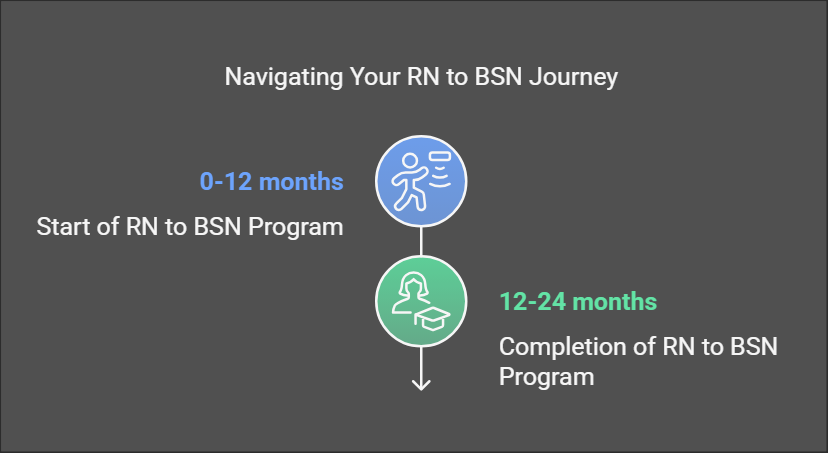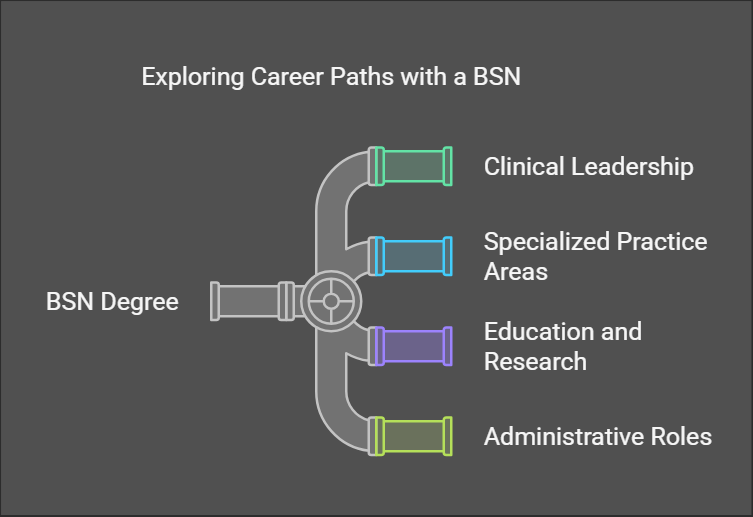As healthcare continues to evolve, registered nurses (RNs) face increased pressure to further their education and obtain a Bachelor of Science in Nursing (BSN) degree. Whether motivated by employer requirements, personal growth goals, or career advancement aspirations; earning a BSN has become a priority goal of many nursing professionals. This comprehensive guide offers everything you need to know about RN to BSN programs from benefits to practical implementation strategies – providing everything you need to know for success as an RN-to-BSN candidate.
Why Pursue a BSN Degree?
Deciding to upgrade from an RN to a BSN represents more than simply earning another credential – it’s an investment in your professional future and the quality of patient care you can deliver. Healthcare organizations increasingly acknowledge the benefits of hiring BSN-educated nurses; research demonstrates improved patient outcomes in facilities with higher proportions of BSN-educated staff.
American Association of Colleges of Nursing (AACN) reports that BSN-prepared nurses exhibit greater critical thinking skills, leadership qualities, and clinical judgment – which translate to improved patient care metrics like lower mortality rates and medical errors. Furthermore, many healthcare facilities now prefer or even require BSN degrees as an essential pathway toward career growth.
Financially, BSN-trained nurses enjoy distinct advantages; BSN holders typically earn between $8000 to $12 000 more annually than their RN counterparts, with this disparity becoming even greater when considering advanced positions available only to BSN holders, such as nurse management roles with annual salaries topping $100K annually.
What to Expect in an RN to BSN Program
RN to BSN programs are specifically tailored for working nurses, building upon existing knowledge while simultaneously introducing fresh concepts and perspectives. Typically these programs take 120 credit hours but RNs often transfer credit from prior studies or work experience.
The curriculum emphasizes increasing your understanding of nursing theory, research, leadership and population health. Core courses may include:
- Advanced Health Assessment Evaluation.
- Nursing Research and Evidence-Based Practice
- Community and Public Health Nursing.
- Healthcare Policy and Economics.
- Leadership and Administration in Nursing.
- Population Health and Promotion are of equal importance.
Many programs recognize the needs of working professionals by offering flexible learning formats, such as online programs. Nurses can complete coursework on their own time while remaining employed full-time while online options combine online with occasional in-person meetings to provide the best of both worlds. Hybrid options combine the benefits of both approaches.
Depending on transfer credits and course load, completion typically ranges between 12-24 months. Programs often provide multiple starting dates during the year to suit students’ schedules and enable them to begin when it best fits them.
Career Advancement Opportunities
A Bachelor of Science in Nursing degree provides opportunities for career advancement that would otherwise remain closed to you. Not limited to bedside nursing roles, BSN-trained nurses can explore careers such as:
Clinical Leadership: Charge nursing positions, unit management roles and clinical coordinator roles often require at least a Bachelor of Science in Nursing as a minimum qualification. These positions often carry with them increased responsibility and compensation while giving nurses the power to shape patient care delivery systems.
Specialized Practice Areas: BSN education is often preferred or required for positions such as case management, infection control and quality improvement nursing roles. Depending on the specific practice area chosen these positions may offer regular hours and the opportunity to focus on particular aspects of healthcare delivery.
Education and Research: With a BSN degree comes the potential for careers in nursing education, clinical research and healthcare quality improvement – positions which allow nurses to advance nursing practice while often offering more flexible working hours.
Administrative Roles in Healthcare: For healthcare administration roles such as nurse manager or director roles, BSN is usually required as the minimum qualification. These positions can offer significant salary increases as well as the chance to influence organizational policy and practice.
Balance Work and Education by Maintaining Work/Education Equilibrium
Success at managing work responsibilities while pursuing education requires careful planning and effective time management strategies. Many nurses find success by following these strategies:
Launch by undertaking an honest assessment of your current obligations and available time. Most successful students dedicate 15-20 hours per week to studying, including reading assignments and participating in online discussions.
Communication with employers and colleagues is of utmost importance when seeking higher education. Many healthcare organizations offer flexible schedules to employees pursuing advanced degrees; some even provide dedicated study time or adjust work schedules around key academic deadlines.
Financial Considerations
Careful consideration must be given to the financial implications of earning a BSN degree before making an informed decision. Though initial costs may seem substantial, their long-term rewards often outweigh these expenses significantly.
An RN to BSN degree typically costs anywhere from $15,000 to $45,000 depending on its institution and program format, but many funding options make the investment more manageable. Employer tuition reimbursement programs, covering 50-100% of education costs; approximately 75% of major healthcare systems offer some type of educational support to their nursing staff members are also a helpful source.
Financial aid opportunities, in addition to employer support, include:
- Federal and state grants and scholarships offered by professional nursing organizations may also provide opportunities for Nursing-specific grants and scholarships.
- Military and veteran benefits.
- Income-driven repayment plans for student loans
- Unions or professional associations that offer professional development funds.
Calculating Return on Investment (ROI), take both immediate and long-term benefits into account when calculating ROI. BSN-prepared nurses typically experience an immediate salary boost shortly after graduation; cumulative earnings will only grow over time. Furthermore, expanding career options and opportunities to advance into leadership roles may compound financial benefits over time.
Selecting an Appropriate Program
Finding an RN to BSN program that best fits your professional and personal objectives takes careful consideration, taking into account multiple variables.
Accreditation should always be your top priority, with programs being accredited either by the Commission on Collegiate Nursing Education (CCNE) or Accreditation Commission for Education in Nursing (ACEN) to ensure your degree will be acknowledged by both employers and graduate schools.
Key factors for assessment include:
- Flexibility of Program: Consider all course delivery methods, scheduling options and completion timeframes carefully when selecting a program. Some offer fast tracks while others permit part-time study over an extended period. Make sure these options align with both your work schedule and personal commitments.
- Support Services: When considering programs that offer comprehensive student support services such as academic advising, technical assistance and career services. Strong support systems have a dramatic effect on success rates and overall satisfaction among their participants.
- Clinical Requirements: While most RN to BSN programs focus more heavily on theoretical knowledge rather than clinical skills development, some may require practical components or projects. It’s important to make sure these requirements align with your current work situation.
- Faculty Qualifications and Experience: When considering program faculty members, do your research. Instructors with both academic credentials and practical nursing experience can offer invaluable insights and networking opportunities.
Application Procedure and Requirements for Grants (AppPro and RBA Requirements for Grants).
Navigating the application process successfully takes careful thought and planning. Most RN to BSN programs have set admission requirements that must be fulfilled to gain entry.
- Essential Prerequisites for Admissions to Nursing School (RN Licence in Good Standing).
- Complete an accredited nursing program (ADN or diploma).
- Minimum GPA requirements (typically 2.5 or higher) apply.
- Official transcripts from all prior education are required in order to complete a college application process.
- Professional References or Essay
Many programs also require:
- Current CPR certification, background screening and drug screening tests
- Proof of Immunizations, Liability Insurance etc
- Current employment verification (for certain programs).
Strong applications go beyond satisfying basic requirements. An engaging personal statement must outline your professional goals, demonstrate an appreciation of BSN value, and show commitment to furthering nursing practice. Likewise, letters of recommendation from supervisors or educators who can vouch for your clinical competence and academic potential are vital parts of a strong application package.
Success Strategies
Completing an RN to BSN program takes more than just academic ability; devising effective plans to balance educational demands with professional and personal responsibilities is of equal importance.
- Time Management: Plan an efficient study schedule that fits around work shifts, family obligations and personal obligations. Use digital tools and calendars to keep tabs on assignments and deadlines; break larger projects down into manageable tasks with specific due dates.
- Professional Integration: When possible, try to apply what you have learned in class to your current nursing practice. This integration strengthens learning and can result in immediate improvements to clinical performance. Many programs encourage students to use workplace experiences as case studies or project material.
- Networking: Build relationships with fellow students, faculty members and program alumni who can offer emotional support, academic help and professional opportunities. Many programs provide online forums or study groups specifically for this purpose.
Maintain physical and mental wellbeing through regular exercise, adequate rest, and stress reduction techniques. Remember that striking a balance between work life, family responsibilities, study time, and leisure time is crucial to long-term success.
Final Thoughts
Pursuing your Bachelor of Science in Nursing degree represents an exceptional professional advancement opportunity. While its journey requires dedication and careful planning, its rewards – including increased clinical knowledge, expanded career options, and enhanced earning potential – make it well worth investing in your future.
Start by exploring accredited programs that meet your goals and circumstances. Keep in mind that thousands of nurses manage this transition every year while fulfilling both their professional and personal commitments; with proper planning, support, and determination you too can join their ranks and advance your nursing career further.
Frequently Asked Questions (FAQs)
How long typically take it to complete an RN to BSN program?
An RN to BSN program typically takes between 12-24 months to complete, though its exact timeline depends on several factors. Part-time students might take longer, while those who transfer significant credits or take advantage of accelerated programs could finish sooner. Most programs provide flexible scheduling options so you can tailor your course load based on work and personal commitments.
Can my previous nursing experience count towards earning my BSN degree?
Most RN to BSN programs recognize the value of prior learning and work experience. Many institutions grant credits for your RN license, previous coursework and documented work experience – this can greatly reduce the required courses and overall program duration. Some programs even offer portfolio assessment options to demonstrate competencies gained during work experience for additional credit.
Can I continue working full-time while earning my BSN degree?
Yes, RN to BSN programs are specifically tailored for working nurses. Online and hybrid formats allow the flexibility of fitting coursework around work obligations, while many students successfully combine full-time employment with their studies by taking advantage of asynchronous learning options, flexible deadlines and mobile-friendly course materials. Successful time management and organization skills are critical for success in such endeavors.
What sets online RN to BSN programs apart from traditional campus programs?
Online RN to BSN programs have several distinct advantages over their campus counterparts while upholding rigorous academic standards. Key differences include:
- Flexibility in scheduling and pace of learning
- Reduce or eliminate commute times
- Access digital learning resources 24/7
- Group projects benefit from virtual collaboration tools for success.
- Interactive learning platforms that track your progress
- Regular online interaction between faculty and peers.
Enhance learning experiences using technology
How will obtaining a BSN degree affect my salary potential?
Salary increases for BSN-prepared nurses can vary significantly by region and employer, yet these graduates usually reap significant financial advantages. Beyond an immediate salary differential of around $8K-12,000 annually, BSN holders qualify for advanced roles with higher pay scales such as leadership roles or advanced practice opportunities that increase long-term earning potential significantly.
What forms of financial aid are available to RN to BSN students?
Financial support options are many and varied:
- Federal Student Aid (FAFSA)
- Employ tuition reimbursement plans.
- Professional Nursing Organization Scholarships.
- State-specific nursing education grants
- Educational partnerships within the healthcare system
- Military and veteran education benefits.
- Income-based repayment options for private education loans
How can I tell if a program has been accredited properly?
Legitimate RN to BSN programs should hold accreditation from either CCNE or ACEN. You can check their status online here:
The U.S. Department of Education database
Website of an Accrediting Body
Documents related to nursing programs
State Board of Nursing websites
What type of support services are typically available to online BSN students?
Modern RN to BSN programs provide extensive support services, such as:
- Academic advisors specializing in nursing education
- 24/7 technical support for online learning platforms
- Virtual library resources and research assistance services.
- Writing centers and tutoring services
- Career counseling and job search assistance services.
- Professional Development Resources Are Now Available
- Alumni networking opportunities.
How can I select an appropriate program?
Consider these key elements when evaluating programs:
- Accreditation Status and Reputation.
- Flexibility and format selection options available with programs are crucial components to their success.
- Financial Aid is Available and Total Credit Transfer Policies are in Place
- Support services for online learners
- Graduate success rates and employment outcomes
- Faculty credentials and experience.
- Technological requirements and support services.



